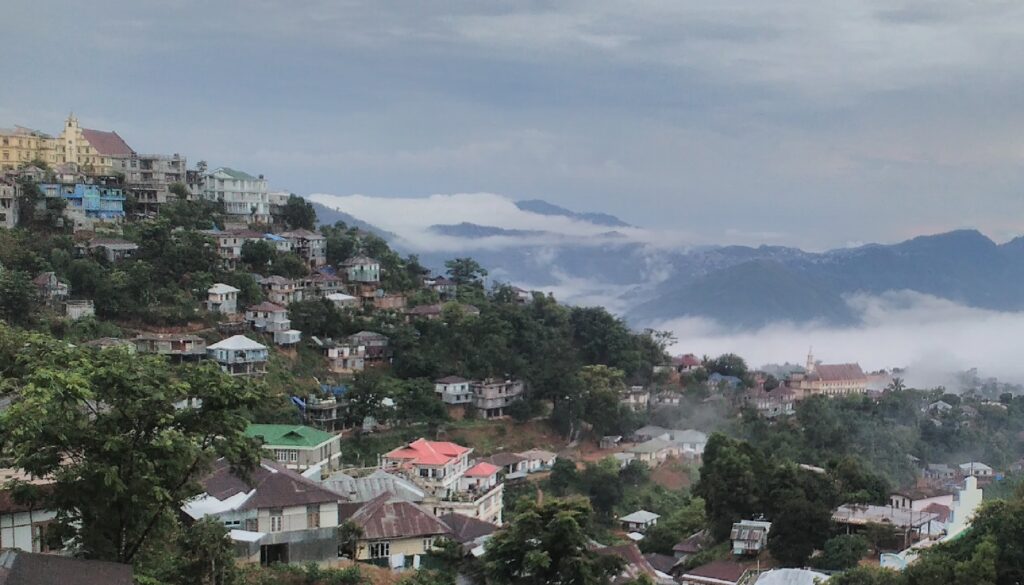Mizoram: A Land of Rolling Hills, Vibrant Culture, and Enduring Spirit
Tucked away in Northeastern India’s verdant embrace, Mizoram is a mosaic of undulating hills, beautiful valleys, and colorful indigenous cultures. This landlocked tiny state, which is tucked between Assam, Manipur, and Tripura and borders Myanmar to the east, has a fascinating natural beauty that is just waiting to be discovered, along with a rich history and a strong feeling of community.
A Glimpse into the Past: From Headhunting Warriors to Peaceful Paradise
The history of Mizoram is replete with tales of tenacity and cultural development. It is thought that centuries ago, the Mizo people—the dominant ethnic group—migrated from Southeast Asia with their ancestors. They developed a sophisticated social system based on villages and included headhunting into their cultural practices.
A turning point occurred with the arrival of the British in the 19th century. The Mizo warriors and the British clashed as the British tried to take control of the area. But the Mizos opposed with ferocity, displaying their courage and steadfastness. The late 19th and early 20th centuries saw the introduction of Christianity by missionaries, which had a profound impact on Mizo society. Christianity took over as the predominant religion once headhunting was outlawed.
In 1987, Mizoram became a state, ushering in a new era in its history. Since then, the state has prioritized development and worked to raise standards for both education and infrastructure. Today, with a high literacy rate and a dedication to sustainable development, Mizoram stands as a beacon of peace and growth in the Northeast.
A Tapestry of Tribes: Celebrating Cultural Diversity
The sub-tribes that make up Mizo civilization are colorful mosaics, each with its own language, traditions, and dress codes. The main sub-tribe, the Lushai, are well-known for their oral heritage of folktales and songs, as well as their history of headhunting. Renowned for their ability to weave, the Pawi people produce beautiful fabrics that are embellished with vibrant patterns. The core idea of Mizo culture is ‘Tlawm,’ a philosophy emphasizing independence, community, and deference to elders.
Every year in December, the Chapchar Kut festival is a colorful celebration of Mizo culture. Individuals from all backgrounds assemble in traditional clothing to display their singing and dancing prowess. The celebration honors the Mizo people’s rich cultural legacy and resilient character.
A Feast for the Senses: Culinary Delights and Artistic Expressions
Mizo food is a delectable representation of the natural abundance of the region. The main food is rice, which is frequently served with stews and curries made with fish, vegetables, and bamboo shoots that are purchased locally. Mizo cuisine heavily emphasizes pork and smoked meats, which reflects their close ties to the earth. ‘Chhum,’ a unique-tasting fermented fish salad, is a local favorite.
In addition to food, Mizoram has a strong artistic heritage. Weavers of delicate baskets for carrying and storing possess a skill that is highly valued. Another kind of art is wood carving, which is used to ornament furniture and other household objects with images of animals and mythological creatures. Certain settlements have thriving blacksmithing, as seen by the production of age-old tools and weapons.
A Haven for Nature Lovers: Untamed Beauty Beckons
For those who love the outdoors, Mizoram’s rolling hills, gushing waterfalls, and tranquil lakes provide a sanctuary. Hiking paths wind through verdant woodlands and lead to stunning vantage points and little-known waterfalls. The highest point in Mizoram, the magnificent Phusawngpudte Blue Mountain, offers panoramic views and a strenuous hike. Nestled amidst undulating hills, Tam Dil Lake’s quiet beauty provides a peaceful haven.
Numerous wildlife sanctuaries can be found in the state, like the Mizoram Gulf Wildlife Sanctuary, which offers chances to see a variety of flora and fauna, including uncommon bird species and elusive creatures like the Asian elephant and the clouded leopard.
A Journey Through Faith: A Land Steeped in Christianity
In Mizoram, Christianity is the most common religion and most people follow different denominations. In Mizo society, the church is very important because it promotes a strong sense of belonging and common ideals. Nonetheless, several Mizo traditions still hold onto traces of animistic beliefs, which entail the veneration of ancestors and natural spirits, giving rise to a distinctive religious landscape.
Challenges and Looking Ahead: Balancing Growth and Tradition
Mizoram has difficulties despite its stunning natural beauty and rich cultural legacy. Infrastructure development is still a top priority, especially in rural areas. The state also aims to increase the number of jobs available to its youthful population. It is a continuous effort to strike a balance between the preservation of the distinctive Mizo culture and customs and economic prosperity.
Summary
In conclusion, Mizoram is a place of unmatched natural beauty and cultural diversity, where modernization and tradition coexist together. Mizoram provides visitors with an experience that is absolutely unforgettable, ranging from its colorful festivals and traditional arts to its gorgeous scenery and kind people. Travelers are invited to explore the state’s charms and experience the magic of the Mizo way of life as it has the potential to become one of India’s top tourist destinations as it continues to open up to tourism.

